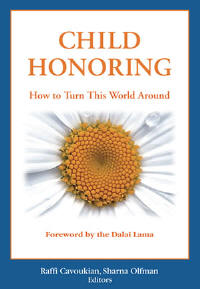|
Child Honoring: How to Turn This
World Around
By Raffi Cavoukian and Sharna Olfman (Editors)
Reviewed by Katharina Manassis
|
 |
Raffi Cavoukian (a.k.a. Raffi, popular children’s entertainer) introduces
the subject of this book by saying “I’m grateful to all those who have
taught me about the wondrous ways of the child, and about the child in all
of us”. In presenting this ambitiously titled anthology, he invites us to
imagine what the world would be like if all fields, from economics to
education; from parenting to planetary ecology started from this vantage
point.
Raffi has assembled an impressive list of like-minded authors to illustrate
and apply this ideal in their own areas of expertise. Some of the most
informative chapters summarize in simple language the risks posed to
children by, for example, exposure to industrial toxins (Philip Landrigan)
or disrupted parent-child attachments (Penelope Leach). Innovative
approaches to improve things for the next generation include (among others)
Mary Gordon’s “Roots of Empathy” program, which helps school children
develop empathy by regularly observing infants. A number of authors also
include poignant first person accounts of their own experiences as or with
children.
There were a few chapters that made me cringe, as they included some rather
disparaging and unsubstantiated remarks about “Western Science” in
comparison to “Indigenous Science” (whatever that is), and an idealization
of tribal in comparison to modern forms of social organization. As anyone
with even a passing knowledge of anthropology would admit, life in a tribe
is not always as peaceful and idyllic as these authors would have you
believe. There is also a fair bit of repetition in the book, and a lack of
cross-references between chapters. Oh well, Raffi is obviously a better
entertainer than editor, but the overall aim is still clear and sincere.
One chapter that evoked some thoughts about St. Mark’s was Mathew Fox’s
piece on the spiritual life of children. Fox argues that children’s
spirituality is largely experiential, and thus often neglected in our
increasingly intellectual approaches to faith. His chapter reminded me of
our own children’s recent request for more music and activity in Sunday
School, and of how difficult it can be to get adults to see the value of
participating in such activities. We would be wise to remember, as we
struggle to breathe deeply from the diaphragm to center ourselves, that
young children breathe this way naturally, without giving it a thought. In a
related story, recounted in a November sermon, a big sister approaches her
baby brother’s crib. She whispers to him “Tell me about God. I’ve almost
forgotten.” As Raffi and his co-authors remind us, we could all learn some
important lessons from those younger than ourselves.




